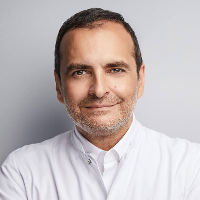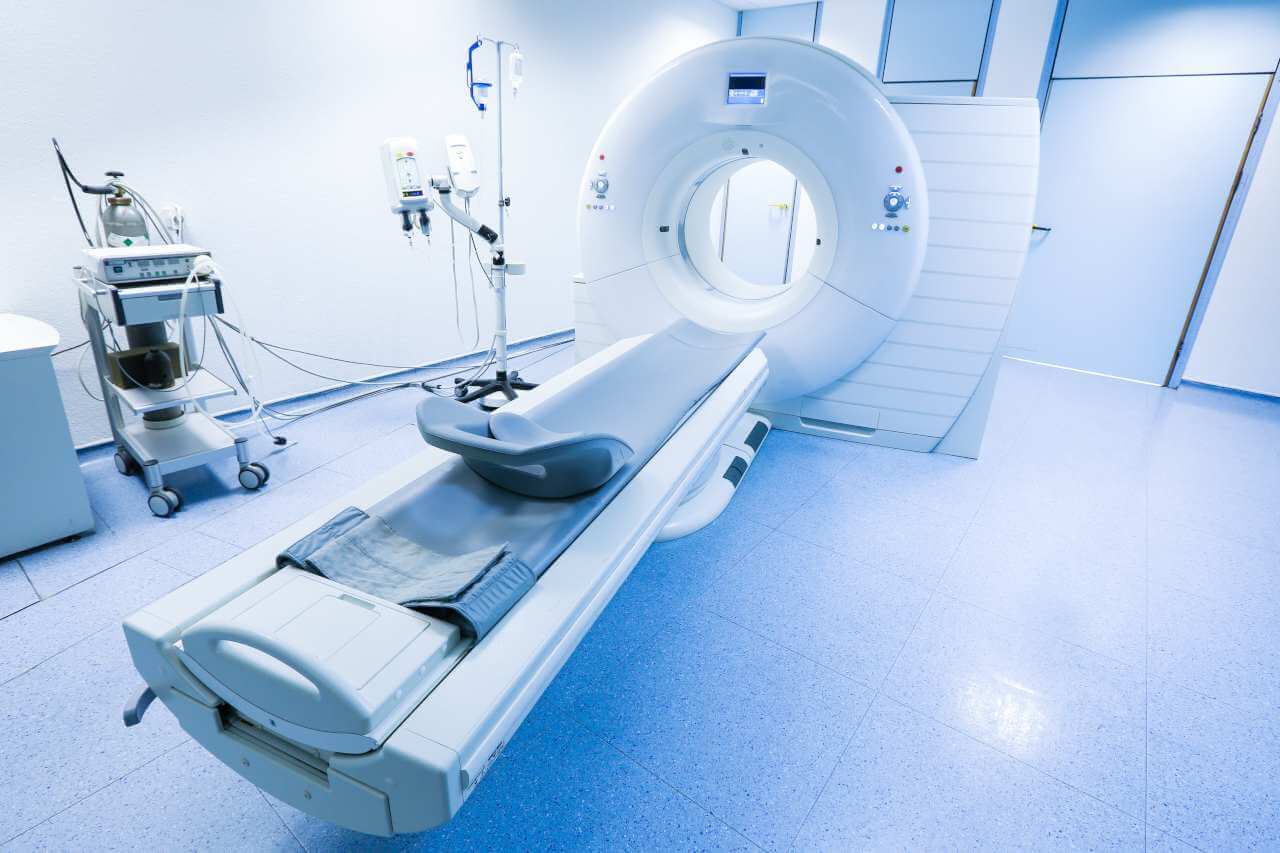
The program includes:
- Initial presentation in the clinic
- clinical history taking
- review of medical records
- physical examination
- general neurological examination
- neuropsychological tests:
- electroneuromyography (ENMG)
- laboratory tests:
- complete blood count
- inflammatory indicators (CRP, ESR)
- indicators of blood coagulation
- X-ray of spine
- CT scan of spinal cord (on indication 650 €)
- MRI scan of spinal cord (on indication 1200 €)
- nursing services
- consultation of all leading experts
- development of individual treatment plan
- written statement
Required documents
- Medical records
- X-ray examination, MRI/CT scan (if available)
Service
You may also book:
 BookingHealth Price from:
BookingHealth Price from:
About the department
The Department of Adult and Pediatric Orthopedics, Traumatology, Foot Surgery and Spinal Surgery at the Meoclinic Hospital Berlin provides the full range of conservative and surgical treatment of musculoskeletal diseases. The department provides medical care to patients with traumatic injuries, including sports injuries, knee, hip, shoulder and ankle diseases, as well as to patients with spinal injuries and diseases. The department has a special competence in the field of arthroscopy, joint replacement surgery and surgical treatment of spinal pathologies. Of particular interest in the field of pediatric orthopedics is the treatment of congenital musculoskeletal malformations in children, as well as the treatment of acquired orthopedic pathologies and injuries. The department's doctors have modern diagnostic equipment for a comprehensive examination of all musculoskeletal structures and the development of the most effective treatment regimen. The department's doctors devote enough time to personal communication with each patient, thoroughly study the anamnesis and diagnostic data, and then provide the appropriate treatment. Whenever possible, conservative techniques are preferred, and if surgery is required, sparing minimally invasive interventions are performed.
The department is headed by Prof. Dr. med. Michael Akbar. According to the Focus magazine, the doctor ranks among the best German specialists in the surgical treatment of spinal pathologies. He has performed more than 10,000 successful spinal interventions.
The department's specialists have been treating arthrosis for many years. With appropriate clinical indications, conservative treatment methods are prescribed: taking pills, applying ointments, intra-articular injections, therapeutic exercises and physiotherapy procedures. Unfortunately, patients often seek help in the advanced stages of pathology, when the only effective treatment is surgical intervention for partial or total joint replacement with a prosthesis. The department's orthopedists successfully perform knee and hip replacement surgery. At the stage of preparation for the surgical intervention, laboratory blood tests, X-ray and ultrasound scanning, as well as computed tomography and/or magnetic resonance imaging are conducted. The doctors of the medical facility use minimally invasive techniques in their work, which ensure quick recovery of patients and mild pain syndrome. As a rule, already on the first day after the joint replacement surgery, the patient can get out of bed and move around on his own. The period of hospitalization after the surgical treatment is 7-10 days, after which the patient is recommended rehabilitation in a specialized medical center.
Another important area of the department's work is arthroscopic interventions for the diagnostics and treatment of the knee, shoulder, elbow and ankle joints. The surgical interventions are performed through miniature skin incisions, using a special tool – an arthroscope. During the manipulation, the doctor makes only two incisions 5-6 mm long in the joint area, which ensures minimal invasiveness of the procedure. The arthroscope is inserted through the incisions. Depending on the severity of the joint injury, either general or local anesthesia can be used. Arthroscopic interventions are indicated for the patients with rotator cuff tear, impingement syndrome, shoulder instability, meniscus and cruciate ligament injuries, patellar dislocation, foreign bodies in the elbow joint, etc.
The department's range of services is complemented by the diagnostics and treatment of foot and ankle diseases, including in children. The most common pathologies in the department's clinical practice are toe and foot deformities. The department's specialists also admit patients with traumatic and degenerative injuries of the foot and ankle joint. To assess the anatomical structure of the foot, the department uses the very latest diagnostic examinations: digital X-ray, computed tomography, magnetic resonance imaging, ultrasound scanning, dynamic and static pedography with digital image processing. To correct foot and ankle deformities, the use of special orthoses and insoles is often sufficient. If such therapy does not give the desired result, the department's specialists consider surgical treatment using percutaneous, minimally invasive and open surgical techniques.
The special focus of the medical facility is on the treatment of spinal diseases. The department's orthopedists specialize in the treatment of degenerative and infectious spinal diseases, spinal injuries and tumors, as well as in the correction of spinal deformities in adults and children. Spinal surgeons have in their arsenal advanced surgical techniques: minimally invasive, microsurgical and endoscopic ones. Thus, patients do not require long-term hospitalization after surgery, and surgical risks are almost zero.
The department admits children and adolescents with various musculoskeletal diseases. Of particular interest is the treatment of bone fractures, dislocations and scoliosis. During the therapeutic process, both conservative and surgical techniques are used. When planning treatment, the specialists always take into account the age of a young patient and the level of his physical development, since it is important for them not only to save the child from pathology, but also to ensure the proper further development of the growing organism.
The department's main clinical focuses include:
- Treatment of musculoskeletal injuries of any severity in adults and children
- Joint replacement surgery
- Partial and total knee replacement
- Partial and total hip replacement
- Arthroscopy
- Shoulder arthroscopy
- Rotator cuff tear
- Shoulder instability
- Calcific tendonitis
- Impingement syndrome
- Articular lip injuries
- Biceps tendon injuries
- Knee arthroscopy
- Meniscus injuries
- Anterior cruciate ligament injuries
- Patellar dislocation
- Knee cartilage lesions (microfracture, autologous chondrocyte transplantation and autologous matrix-induced chondrogenesis)
- Elbow arthroscopy
- Free articular body removal
- Elbow instability
- Ankle arthroscopy
- Shoulder arthroscopy
- Foot surgery
- Hallux valgus
- Minimally invasive interventions
- Stabilizing surgery
- Corrective interventions
- Revision surgery
- Hallux rigidus
- Joint-preserving operations
- Cartilage replacement in the metatarsophalangeal joint
- Osteosynthesis
- Revision surgery
- Toe deformities (hammer toes, claw toes, toe dislocations)
- Minimally invasive interventions
- Classic open surgery
- Percutaneous surgical interventions
- Revision surgery
- Flat feet in adults and children
- Minimally invasive interventions
- Percutaneous surgical interventions
- Achilles tendon lengthening (open, percutaneous)
- Ankle diseases and traumatic injuries
- Foot ligament plastic surgery
- Foot tendon plastic surgery (tendon suture, transposition)
- Foot cartilage reconstruction
- Calcaneal osteotomy
- Ankle joint replacement
- Revision foot and ankle surgery
- Ankle arthroscopy
- Arthroscopic treatment of cartilage defects in the upper part of the ankle joint
- Hallux valgus
- Spinal surgery
- Treatment of degenerative spinal diseases
- Spinal disc herniation
- Spinal stenosis
- Spondylosis
- Spondyloarthritis
- Osteochondrosis
- Spondylolisthesis
- Treatment of spinal deformities in children and adolescents
- Idiopathic scoliosis
- Neuromuscular scoliosis
- Neuromuscular kyphoscoliosis
- Atypical scoliosis
- Kyphosis
- Spondylolisthesis
- Treatment of spinal deformities in adults
- Degenerative scoliosis
- Kyphosis
- Post-traumatic kyphosis
- Kyphosis caused by ankylosing spondylitis
- Spondylolisthesis
- Flat back syndrome
- Treatment of infectious spinal diseases
- Spondylodiscitis
- Treatment of spinal fractures
- Treatment of primary and secondary spinal tumors
- Treatment of degenerative spinal diseases
- Other medical services
The range of conservative treatment methods provided in the department:
- Shockwave therapy
- Sanakin regenerative therapy
- Manual therapy
- Therapeutic exercises
- Lymphatic drainage
- Osteopathy
- Electrotherapy
- Ultrasound therapy
- Injection therapy with hyaluronic acid, cortisone and local anesthetics
- Classic massage
- Lomi Lomi massage
- Fascial techniques
- Pilates
- Kinesiology taping
- Other types of conservative therapy
Curriculum vitae
Professional Career
- July 2016 Additional qualification in Special Orthopedic Surgery.
- June 2015 - March 2020 Head of the Spinal Surgery Center in the Department of Orthopedics and Traumatology at the University Hospital Heidelberg.
- January 2015 Basic Certificate and Master's Certificate of the German Spine Society (DWG).
- October 2013 Additional qualification in Special Traumatology.
- Since October 2008 Senior Physician, Department of Spinal Surgery, Department of Orthopedics and Traumatology, University Hospital Heidelberg.
- October 2008 Board certification in Orthopedics and Traumatology.
- 2001 - 2008 Assistant Physician, Department of Orthopedics and Traumatology at the University Hospital Heidelberg.
- March 2000 - February 2001 Internship, Department of Surgery at the Charite University Hospital Berlin.
Research Activities
- Since January 2020 Advisory Board Member of the German Scoliosis Patient Care Organization.
- Since November 2018 Advisory Board Member of "Der Orthopäde" journal.
- March 2017 DSQ Research Promotion 2017 Prize of the German Paraplegia Foundation.
- January 2017 Habilitation in Orthopedics and Traumatology, Heidelberg University. Subject: "Pathological changes in the shoulder joints in patients who suffer from paralysis of the lower limbs for a long time and move with the help of a wheelchair".
- December 2015 3rd Poster Award at the 10th German Spine Congress in Frankfurt am Main. Subject: "Sagittal profile of the cervical spine in patients with adolescent idiopathic scoliosis".
- 2012 and 2013 Lautenschläger Scholarship of Heidelberg University with an Internship at the Spine Center in New York at the Clinic for Joint Diseases on the basis of the Faculty of Medicine at New York University.
- May 2010 Vernon Nickel Award of the American Orthopedic Rehabilitation Association (ORA) for the paper: "Prevalence of shoulder rotator cuff tear in patients with lower limb paralysis as compared to a control group (case-control study).
- May 2006 Poster Award of the Foundation for Orthopedic Trauma at the University Hospital Heidelberg.
- May 2002 Doctorate thesis at the Faculty of Human Medicine at the Free University of Berlin. Subject: "Molecular biological examinations of the expression of subunits of endothelial calcium-activated high conductance potassium channels (BKCa channel)".
- April 2000 Research Grant from the German Society of Vascular Surgery and Vascular Medicine and Meadox/Boston Scientific Germany Corporation.
Review Activities
- Der Orthopäde.
- Journal for Shoulder and Elbow Surgery (JSES).
- BMS Surgery.
- PLOS One.
- Journal of Spinal Cord Medicine (JSCM).
- Spinal Cord.
- Zeitschrift für Orthopädie und Unfallchirurgie.
- Journal of Clinical Medicine (JCM).
Memberships in Professional Societies
- German Spine Society (DWG).
- EUROSPINE.
Photo of the doctor: (c) Meoclinic
About hospital
The Meoclinic Hospital Berlin is one of Germany's most renowned multidisciplinary private hospitals offering top-class and patient-centered medical care. The hospital opened its doors to patients back in 2000 and today is deservedly proud of its vast experience. It has 28 specialized departments, each of which is responsible for the treatment of a particular group of diseases. A highly professional medical team consisting of 67 doctors takes care of the health of patients. The basis of the work of the doctors of the hospital is the use of the most advanced and, if possible, sparing treatment methods. The hospital is certified according to ISO 9001:2015 standards, so patients benefit from the highest level of the quality of service, adherence to hygiene and safety standards.
The hospital includes almost all fields of modern medicine: internal medicine, general and abdominal surgery, endocrine surgery, vascular surgery, hernia repair surgery, hand surgery, plastic surgery, pediatric surgery, cardiology, pulmonology, gastroenterology, rheumatology, proctology, gynecology, urology, ophthalmology, orthopedics, neurology, neurosurgery. To provide surgical treatment, the hospital has three high-tech surgical suites, which perform both minimally invasive interventions and DaVinci robot-assisted interventions, as well as the most complex operations lasting several hours. In addition, the hospital has an advanced Radiology Center with innovative devices for computed tomography, magnetic resonance imaging, ultrasound diagnostics and X-ray scanning. These resources allow providing accurate diagnostics and effective treatment of the highest European level.
Despite the fact that the hospital has advanced technologies and modern infrastructure, the focus of the medical staff is on the patient – his needs, wishes and well-being. During the treatment in this medical center, patients are surrounded by care, comfort, and they are treated with maximum respect and understanding. The doctors of the hospital use all their professionalism and medical knowledge for the benefit of patients, saving lives even in particularly complex cases.
Photo: (с) depositphotos
Accommodation in hospital
Patients rooms
The patients of the Meoclinic Hospital Berlin live in well furnished rooms, corresponding to the level of luxury five-star hotels. There is a fantastic view from the windows of the patient rooms on the Gendarmenmarkt, the Reichstag, the Friedrichstrasse or the courtyard of the hospital. The hospital has a pleasant atmosphere, which is also facilitated by soothing colors. The standard patient rooms include a comfortable bed, a bedside table, a desk and chairs, a wardrobe with a built-in safe for storing valuables, air conditioning, a minibar, a TV and a telephone. Free Wi-Fi is available in the patient rooms. Each patient room has an ensuite bathroom with shower and toilet, heated floor. There are bath slippers, towels and toiletries in the bathroom. A bathrobe, shower caps, shaving kit and hairdryer are available upon request.
Meals and Menus
The patients of the hospital are offered tasty and healthy three meals a day: breakfast, lunch and dinner. The menu mainly includes vegetable, fruit, poultry and fish dishes. Each patient has a choice of several menus, including traditional Russian and Arabic cuisine, as well as kosher and vegetarian meals.
If for some reason you do not eat all foods, you will be offered an individual menu. Please inform the medical staff about your dietary preferences prior to treatment.
Further details
Standard rooms include:
Accompanying person
Your accompanying person may stay with you in your patient room or at the hotel of your choice during the inpatient program.
Hotel
You may stay at the hotel of your choice during the outpatient program. Our managers will support you for selecting the best option.




